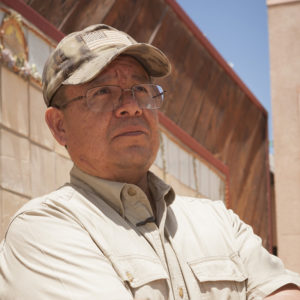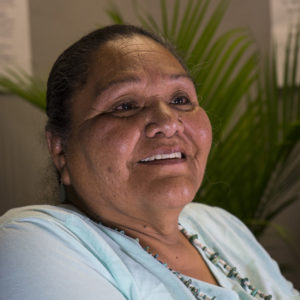Navajo Nation Know Your Vote Guide
Voting is a public way of saying, “Our families count, and all of our families matter!”
Introduction
Civic participation means getting everyday folks involved in the decisions that affect our families and communities. During election season we can speak up and get involved in the process. We can vote, share our stories, attend chapter and other community meetings, and take many other actions both small and large that impact decision making.
Elections matter because elected leaders make decisions that can either help or hurt our families. Those elected often pay more attention to community members who vote.
Members of the Navajo Nation have the right to participate in both the sovereign Navajo Nation’s government and the federal, state, and local governments of the United States. By navigating both governments, Navajo voters can impact our daily lives and the lives of generations to come.
Why Vote?
Voting in Navajo Nation elections
Voting in Navajo Nation elections means having a voice in tribal government and decisions. This guide features information about the president, vice president, and council delegates.
Voting in New Mexico
Voting in New Mexico and federal elections means voting for offices that include U.S. president, New Mexico secretary of state, county commissioners, and many others. Elected leaders make important decisions that can impact our daily lives. For example, county commissioners make decisions on funding for road projects, public transportation, community centers, and other programs and services that we often need and rely on. For a longer list of positions up for election in 2018, their responsibilities, and what it means for you, take a look at our Know Your Vote — New Mexico guide in the New Mexico resources section of our website (forwardtogether.org/StrongFamiliesNM).
Navajo Nation Elections
Key 2018 Dates
October 8 – Last day to register to vote in the Navajo general election and the absentee ballot becomes available upon request
October 22 – Deadline to request an absentee ballot; mailed applications must be received by Navajo elections offices on or before this date
November 2 – Last day to vote early and in person at Navajo elections offices
November 6 – Election Day and absentee ballot return deadline
Who Can Vote
To vote in Navajo Nation elections, you must be at least 18 years old, an enrolled member of the tribe, and registered to vote with the Navajo Nation elections office. You must be at least one-quarter Navajo to be enrolled as a tribal member. Registration to vote may require a copy of your Certificate of Indian Blood and photo ID. If you are new to the chapter and your name is not found at the polls on the registration list, you may be asked to provide a receipt of your voter registration.
Am I already registered?
You must be registered in order to vote. To remain registered you must vote in every major Navajo Nation election. If you did not vote in the last Navajo Nation election, you must re-register. To check your registration status, contact the Navajo Nation elections office directly at 1-800-775-8683.
Step One - Register
You can register at most chapter houses. Navajo members living off the reservation can register in person with a certified Navajo Nation registrar. If you are not able to register in person, call the elections office at 1-800-775-8683 and a registrar will fill out the form for you. The elections office will mail the filled-in form to you and request copies of documents to return. For Navajo Nation registration the required documents are your Certificate of Indian Blood, your Social Security Card, and a photo ID. Sign and return the form to the elections office, along with copies of the required documentation.
New Mexico Elections
Who Can Vote
To vote in New Mexico and U.S. elections, you must be 18 years old or older and a U.S. citizen.
17-year-olds can register to vote AND vote in primary elections, as long as they turn 18 on or before the general election.
Individuals convicted of a felony cannot vote while incarcerated, on parole, or on probation. Those who have completed these terms need to re-register to vote.
Am I Already Registered?
You need to register in order to vote in any local, state, or federal elections. Check your voter registration status — prior to an election — by visiting New Mexico’s Secretary of State website. Unlike Navajo Nation elections, you do not have to vote in every election in order to stay registered. But, you must update your voter registration if you want to change your party affiliation, if your name changed, or if you moved (even within the same city).
Step One - Register
You can register to vote by filling out a paper registration form or with the assistance of a Third-Party Registration Agent. Forms are available at your local post office, motor vehicle departments, public assistance offices, any county clerk’s office, and at the Office of the Secretary of State. Forms can also be requested by mail, telephone, or in person. You can also register online by going to this link: bit.ly/NMVoterReg. You must submit your registration at least 28 days prior to an election.
Step Two - Vote!
You can vote in person during the early voting period or on Election Day. You may also vote by mail with an absentee ballot during the allowed timeframe. For more information on the absentee ballot process contact the New Mexico Secretary of State’s Office or visit their website. No matter what method you use, your vote is a secret.
Voting Assistance
Voting assistance is available and may be requested at the polls if you are unable to read or write, physically disabled, blind, or speak a language other than English. You can choose who assists you in the voting booth, as long as they are not a candidate on the ballot, your employer, or a representative of your union.
Navajo Nation Elections
Navajo Nation Leadership • Navajo Nation government is composed of an executive branch led by the president who is elected by Navajo Nation voters, a legislative branch that includes 24 council delegates elected from local chapters, and a judicial branch.
President
Key Responsibilities
- Signs laws passed by the council delegates.
- Oversees key offices such as the Department of Health, Environmental Protection Agency, Division of Economic Development, and Division of Social Services.
- Maintains relationships and coordination of legislation and treaties with the United States government, ensuring the rights and sovereignty of the Navajo Nation.
What This Means for You
- Makes decisions about funding for public safety, education, and other public institutions that rely on Navajo Nation funding.
- Represents Navajo people regarding environmental decisions and land use.
- Leads the public safety sector of the Navajo Nation, which trains incoming law enforcement.
Vice President
Key Responsibilities
- Leads alongside the president as the head of the executive branch.
- Takes over the roles and responsibilities of the president in the instance that the president is not available or dies during the president’s and vice president’s concurrent terms.
What This Means for You
- Makes decisions about funding for public safety, education, and other public institutions that rely on Navajo Nation funding.
- Represents Navajo people regarding environmental decisions and land use.
- Leads the public safety sector of the Navajo Nation, which trains incoming law enforcement.
Council Delegates
Key Responsibilities
- Main power holders in the legislative branch of government, and so create, approve, change, and remove laws and policies that then go to the executive branch for approval.
- Serve on committees that are dedicated to certain aspects of governance, such as budget and finance, education, health, and human services, and law and order.
- Hold four regular sessions during the year.
What This Means for You
- Approve funding requests for education, including the Navajo Nation Head Start Program.
- Approve funding for housing, transportation, and infrastructure projects such as roads, solar lights, and water lines.
- Can pass laws affecting land use and land purchases.


